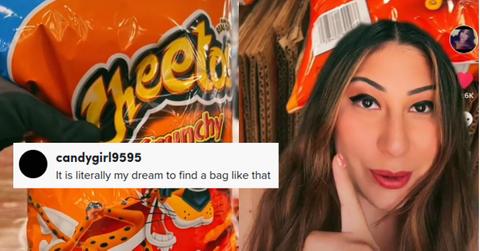Frito-Lay Employee Reveals Truth Behind "Air” in Chips Bags in Viral TikTok
Published June 15 2022, 9:09 a.m. ET

The way that some products are designed lead people to think that they are more prone to getting "scammed" when they purchase them than others.
Disposable vapes, for example, have a tendency to be packed with batteries that run out too quickly. And if they aren't one of the fancy new ones with charging ports, you're crap out of luck.
When it comes to food, there are some items that are real touch and go. Avocados, for example, need to be stored in a very specific way to ensure you're getting the most bang for your buck. And when you buy bananas by the bunch, you're left with a bunch of them ripening at the same rate, unless they're packaged as brilliantly as these Korean retailers do.
But perhaps the biggest "scam" as far as consumers are concerned in the food industry is the amount of air that's present in bags of chips. Folks will crack open some packaging, getting ready to dig into some Hot Cheetos or Takis or those amazing Late July Jalapeno Lime tortilla chips, and they're greeted with more non-chip real estate than physical snackage.
Of course, outrage ensues, like when you gamble on the shrimp portions at a Chinese food restaurant you've never visited before and learn, every single time, why that's an awful idea.
However, as it turns out, all of this ire may be misplaced, and this Frito-Lay employee is going viral on TikTok for explaining why.
Selena Aragon who posts under the handle @selenaaragon7 said that she works as a merchandiser for Frito-Lay and explained why there's "air" in the bags of chips.
One misconception that she addresses head-on is that there's actually nitrogen injected into the bags and not simply "air."
That's because this particular gas helps to preserve the chips and keep them fresher for longer. But it also serves a dual purpose, by leaving that negative space in the bag, the chips are given some room to "settle" which is essential when it comes to transporting goods.

When these salty treats are packed up and put into boxes and sent out to various stores near and far, they're going to need an extra bit of cushioning to move around and not get smashed up. But Selena says that while Frito-Lay is certainly "not trying to scam" people by putting these not entirely filled bags out, she still lets the fuller bags go onto shelves.

Aragon even states that overfilled bags are considered defective because they aren't given the optimal amount of room to properly move and jostle around during transit, which means that you, the end consumer, will end up with a bag that has more broken bits than you should. Sure, you'll have more bits in general, but the chips are supposed to be measured and sold by weight, not necessarily the physical appearance of bag content dimensions.
That's not to say that she doesn't appreciate an overpacked bag of Cheetos, however, and even remarked as much in the comments. She also writes in a text overlay in the first video posted in this article that the chips "still taste the same" even in the overfilled bag. It's just not ideal for shipping purposes.

Aragon definitively says on her TikTok account, "Frito-Lay is not trying to scam you. They tell you how much chips you're getting when you buy the bag."
And while Aragon is certainly not trying to shill snake oil on behalf of "Big Chip" as there are tons of different outlets that have discussed this phenomenon in the past (I wrote about an air in chips bag lawsuit years ago, too), it seems that plenty of commenters on her post may prefer to get more chips in their bags, regardless of whether or not Frito-Lay thinks its defective.

While it doesn't look like the "air" in chips bags are going anywhere anytime soon, there have been some changes made to them in recent years, like the fact that customers are indeed getting less in their bags as a result of "Shrinkflation."
Doritos, for example, dropped from 9.75 ounces per bag to 9.25.

Wheat Thins have been cut down as well as Mondelez reduced the packaging size from 16 ounces to 14, which results in about 28 fewer thins. The outlet Mouseprint.org has been chronicling manufacturers' down-sizing of popular consumer products: Dawn dish soap, Lay's potato chips, Walmart brand paper towels — there are tons of examples.
Are there any particular products that have shrunk in recent years that really grind your gears?